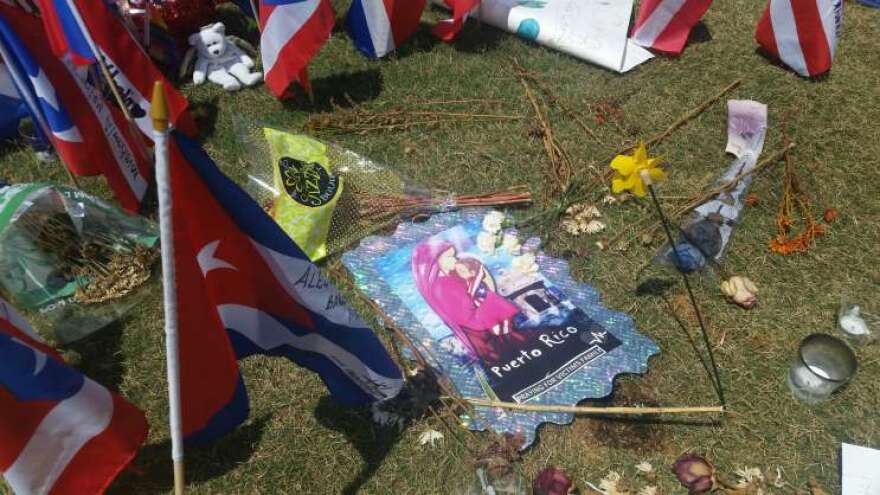The Pulse shooting has sparked conversations about race, religion and sexuality. It’s also put a spotlight on the LGBT and Latino communities. We explore what it means when you’re at the intersection of both of those worlds.
At The Abbey, a chic venue in downtown Orlando, people affected by Pulse, Latino community leaders and media gather before a huge screen.
Jennifer Lopez and Lin-Manuel Miranda talk to the crowd via Skype. The pair teamed up on the anthem “Love Make the World Go Round.” Proceeds are going to a fund to support the victims and their families.
The song has special meaning for survivor Ricardo Negron. The 27 year-old was paying his tab at the club when the shooting started. During a pause in the gunfire he made it out to the patio and got away safe.
Negron’s gay and says he’s lucky to have a supportive family in this difficult time. His parents were in Puerto Rico the day their son escaped the worst mass shooting in recent U.S. history.
“I live here with family and they have been extremely supportive of giving me my space and when I’ve needed them they’ve been there,” said Negron.
Also at The Abbey, 23 year-old Christopher Cuevas. He identifies as queer saying he doesn’t abide by traditional gender roles or norms.
Inspired by Pulse, Cuevas has started a grassroots organization, QLatinx. Latinx is a gender neutral term. Instead of saying 'Latino' or 'Latina', the word defies the masculine and feminine aspects of the Spanish language.
Cuevas came out at 16 to a loving and embracing family,“but I know that isn’t the same for some of the individuals that I work with and some of the individuals that I’m in communication with and so that is a very delicate subject for them and treading between their familial relationships and who they are as a person can be a challenge.”
Cuevas said his organization will give people a safe space, an ad hoc family.
“As I’ve grown older, I’ve recognized that I’m more than just an LGBTQ-plus person, I’m a person of color and I need to understand both of my dual identities and how they merge, how they play hand in hand,” said Cuevas.
Stigmas remain within some Latino families when it comes to LGBT issues. Pew Research Center Surveys show shifting attitudes on same-sex marriage across demographic groups. Hispanic views line up with a 2015 survey that shows a majority 57 percent of Americans support it, 39 percent oppose. That’s up from six years ago.
One of the strongest factors to influence opinion is religion.
75 year-old Santiago Ugarte Herrera sits in a pew near the back of Good Shepard Catholic Church. He says he personally respects people with different sexual orientations, but the church doesn’t accept homosexuality and that his views come from his faith.
In Spanish, he said his generation doesn’t accept that orientation much but he’s not sure about the new generation, they need to give their opinion to [so we can] see how they feel.
The project Somos Orlando emerged after Pulse. It’s a coalition of organizations providing wrap around services for the Latino LGBT community.
“Social services, mental health, legal assistance for those who either lived with a partner but they weren’t formally married or as we’ve seen firsthand undocumented families,” said Zoe Colon, Florida director for the Hispanic Federation, which is administering funds for Somos Orlando.
Colon said some victims and their families may not have asked for help for fear that they or a family member would be deported. She said legal aids are helping those who did come forward get U visas, which are for victims of crime assisting law enforcement with investigations.
They’re helping survivors not only with legal challenges but also with the ones that arise when you belong to both the LGBT and Hispanic communities.

